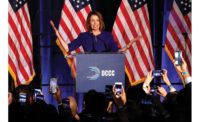There has been a flurry of discussion in Congress on the infrastructure front, but whether the rhetoric will turn into additional federal funds isn’t clear. Recent developments included a Senate hearing on a bill to set up a national infrastructure bank and a meeting of House Democrats on public works financing called by Speaker Nancy Pelosi (D-Calif.). There also are hopes in transportation circles that Congress will draft a second economic stimulus package, including infrastructure aid.
Pelosi’s interest in public works raises the issue’s visibility. Lawmakers at the Capitol Hill meeting she convened on March 12 heard from state and local officials and Wall Street executives on how to think “in a new, fresh way about how we finance the building of our infrastructure,” Pelosi said. “The need is clear. The urgency is great.” But it wasn’t clear what sort of plan Pelosi had in mind.
| BIGGEST SHARES OF PROPOSED $1 BILLION FOR BRIDGES | ||
| Eligibility: major transit, public housing, highway, water projects | ||
| Project size: at least $75 million in federal funds | ||
| Bank sets criteria to rank projects. Preferences include national and regional importance and potential to leverage private financing. | ||
| Bank issues general-purpose or project-based infrastructure bonds. Amount of bonds outstanding capped at $60 billion | ||
| Bond proceeds would be “direct subsidies” to projects; bank also could provide loans or loan guarantees to state and local governments | ||
Source: Text of S. 1926 | ||
Asked about a possible new stimulus measure to follow the one enacted on Feb. 13, Pelosi said, “There may be pieces of this that we would suggest for a stimulus package, but this is much bigger than a counter-cyclical measure. This is not just short term. This is long term.”
In the Senate, banking committee Chairman Christopher Dodd (D-Conn.) has proposed an infrastructure bank that could issue up to $60 billion in bonds for a range of major projects. At a March 11 hearing on the bill, Dodd said he sees the proposal as “creating an architecture” for public-works funding. Linking public and private funding would be one aim. Industry officials don’t think the bill will be approved this year. Jay Hansen, National Asphalt Pavement Association vice president for government affairs, says that in this election year, “I have a hard time seeing Congress pass anything major, and I would put the [Dodd] bill in that category.”
 |
| DODD |
Though Dodd’s bill has only eight co-sponsors, they include Democratic presidential candidates Barack Obama (Ill.) and Hillary Clinton (N.Y.). Brian Deery, senior director of the Associated General Contractors’ highway and transportation division, says he wouldn’t be surprised to see the bank idea in Democrats’ campaign platform.
David Bauer, American Road and Transportation Builders Association senior vice president for government affairs, says the envisioned bank “is not a substitution for any of the existing federal infrastructure programs. It might be a great additive to all of them.”



Post a comment to this article
Report Abusive Comment